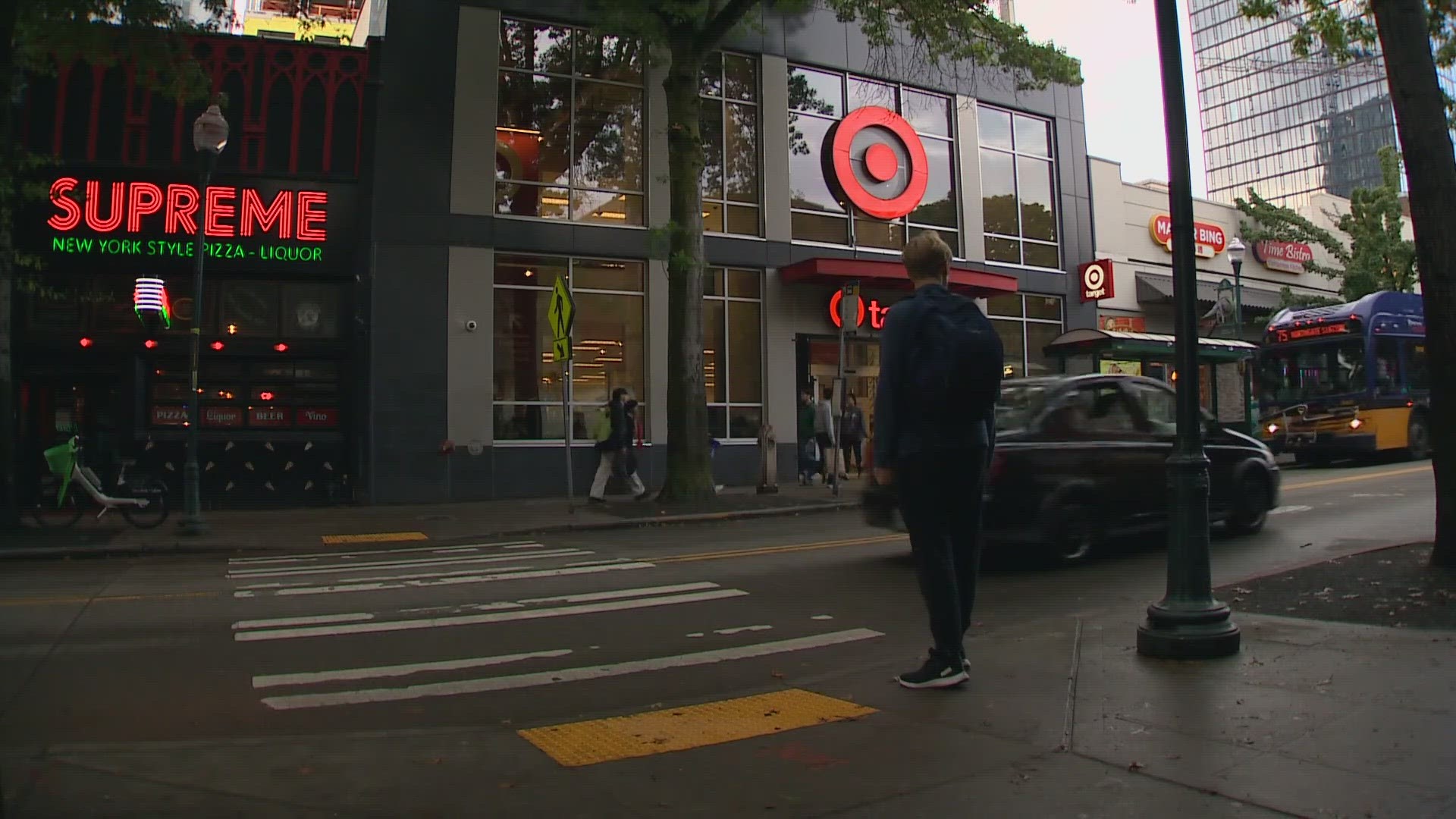SEATTLE — Target announced Tuesday it will close two Seattle area stores in October because theft and organized retail crime are making the locations unsafe for workers and shoppers.
Target said the University Way and Ballard stores will be shuttered on Oct. 21. According to Target, 22 stores will remain open in the Seattle area. About 4,000 people are employed at the various Target locations throughout Seattle.
The store closures are part of nine Target closures across four states, the company said in its release.
Target described the decision as “difficult."
“We know that our stores serve an important role in their communities, but we can only be successful if the working and shopping environment is safe for all," Target said in a statement.
Before making the decision, Target said it had invested heavily in strategies to prevent and stop theft such as adding more security team workers, using third-party guard services and installing theft deterrent tools like locking up merchandise. The company trained store leaders and security team members to protect themselves and de-escalate potential safety issues. But the company noted that despite those efforts, it continued to face “fundamental challenges” to operate the stores safely — and the business performance at these locations was unsustainable.
The University District Partnership released a statement about the closure that read, in part:
"Target’s departure will be a loss for the U District and points to a much larger issue facing our city. Theft and organized retail crime continue to thrive, unchecked in Seattle–facilitated by loosely regulated online marketplaces and fueled by the insatiable demand of the current fentanyl crisis. Our local leaders must continue to act with great urgency to stem the impacts of this ecosystem on our city."
While the store closings account for a fraction of the 1,900 stores Target operates nationwide, it underscores the challenges that retailers like Target face in reducing theft in stores as they wrestle with protecting their workers and customers while trying to serve the community, particularly low-income and minority groups who rely on the local stores for necessities.
Target CEO Brian Cornell has been one of a handful of retail CEOs flagging what they described as rising theft over the past year or so. Cornell had held steadfast he didn't want to resort to closing stores despite mounting losses. Target said in May that theft was cutting into its bottom line and it expected related losses could be $500 million more than last year, when losses from theft were estimated to be anywhere from $700 million to $800 million. So that means losses could top $1.2 billion this fiscal year.
Moreover, Cornell told analysts in August that violent incidents against workers at Target stores increased by 120% for the first five months of the year compared with the same period a year ago.
“Our team continues to face an unacceptable amount of retail theft and organized retail crime,” Cornell told analysts. “Unfortunately, safety incidents associated with theft are moving in the wrong direction.”
It’s unclear how much money retailers broadly are losing due to organized retail crime -- or if the problem has substantially increased. But the issue has received more notice in the past few years as high-profile smash-and-grab retail thefts and flash mob robberies have garnered national media attention. Over the past few quarters, an increasing number of retailers including Dick's Sporting Goods and Ulta Beauty have been calling out rising theft, calling it a factor in shrinking profits.
The National Retail Federation (NRF), the nation’s largest retail trade group, said its latest security survey of roughly 177 retailers found that inventory loss — called shrink — clocked in at an average rate of 1.6% last year, representing $112.1 billion in losses. That's up from 1.4% the previous year.
The greatest portion of shrink — 65% — came from external theft, including products taken during organized shoplifting incidents, the trade group said Tuesday. More than two-thirds of respondents said they were seeing even more violence and aggression from perpetrators of organized retail crime compared with a year ago.
The NRF said that even though retailers continue to improve their loss-prevention measures, sometimes more drastic action must be taken. Nearly 30% of retailers surveyed reported being forced to close a specific store location, and 45% said they needed to reduce operating hours. Roughly 30% said they needed to change or reduce product selection in stores as a direct result of retail crime.
Late last year, Congress passed a bill, called the INFORM ACT, that seeks to combat sales of counterfeit goods and dangerous products by compelling online marketplaces to verify different types of information — including bank account, tax ID and contact details — for sellers who make at least 200 unique sales and earn a minimum of $5,000 in a given year.
Target said Tuesday that it's making significant investments in cyber defense to combat retail theft and fraud and has teamed up with the U.S. Department of Homeland Security's Homeland Security Investigations division to combat retail theft.

